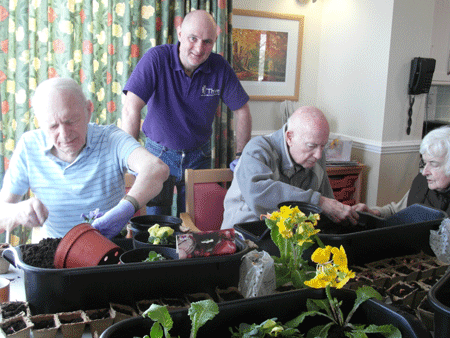Care home staff in Hampshire and Berkshire have praised the charity Thrive for teaching them good ways to help residents garden indoors and out.
Thrive, which uses gardening as a therapeutic tool to help people with disabilities or ill health, has just completed a successful project at 14 care homes.
Often working with activity co-ordinators, a trained horticultural therapist from Thrive took gardening activities into care homes, working directly with the residents and passing on skills to staff so that gardening session could continue once Thrive had left.

Activities included table-top gardening where residents would create hanging baskets, take cuttings, pot on or sow seeds.
Results from the project, which was funded by Comic Relief and The Rayne Foundation, showed high numbers of residents taking part and a great level of enthusiasm shown by staff.
Thrive designed a weekly programme of activities that took into account the varying needs of residents, ensuring maximum inclusion and participation. Gardening proved to be an excellent ‘draw’ for both residents and staff.
Using Social and Therapeutic Horticulture (STH) in this way shows gardening as an accessible and inclusive activity for many who thought it was no longer possible to take part. Thrive used indoor and outdoor spaces to show what can be achieved.
More than 100 gardening sessions were held at care homes in Berkshire, with the charity visiting care homes in Bracknell, Hungerford, Kintbury, Newbury, Reading, Thatcham and Wokingham. In Hampshire Thrive went to Aldershot, Alton, Andover, Basingstoke, Bishops Waltham and Winchester.
Project manager Paul Scott said: “We wanted 112 residents to take part and the actual number was 185 so we were delighted to have had such a high level of participation.
“The project had a number of aims. We wanted to see increased activity amongst residents and physical benefits such as an improvement in peoples’ gross and fine motor skills.
“We witnessed psychological benefits too. These were achieved through residents gaining a sense of hope, meaning and purpose through gardening, and the chance for positive reminiscence facilitating the trigger of happy memories.”
Charmain Jarvis, an activities co-ordinator in Basingstoke, said: “We’ve been able to enjoy conversations about fields of bluebells, flowers that were in their wedding bouquets, the scent of certain flowers like lavender and the memories they bring.
"And we also noticed that some of our residents enjoy coming to the session but are very happy just sitting watching others plant seeds and pot on, listening to the conversations.”
An activities co-ordinator at The Willows, Reading, said: “C was less anxious and held attention for an hour. We were very happy with his participation.”
At Bishops Waltham Care Home in Alton, we were told that “D was very focused on the task and well-motivated. ‘D’ remembered gardening with parents.”
Thrive knows that gardening in this structured way also leads a sense of accomplishment with the ability to undertake and achieve activities independently.
Paul said: “There was a definite increase in social interaction for both residents and staff at all care homes and many said that for them, this was one of the key benefits of the programme. “
Thrive also enabled staff to understand the value and benefits that gardening activities can provide, giving them the confidence to carry on gardening with the residents.
Thrive worked with 46 members of staff at care homes with 87% saying the gardening programme had improved their knowledge, skills and confidence and most importantly 100% said they felt confident enough to run gardening activities programme for residents.
One activities co-ordinator said: “We have a lot of gardening tools, but lacked the knowledge…we have hugely benefitted from this programme.”
Paul Scott added: “Gardening is a very flexible medium and the project has clearly demonstrated that gardening as an activity is highly valued, benefitting both residents and staff.
“For many residents their gardens were so important in their lives. The project has allowed people to reignite their interest and we’ve been able to show how they can continue to garden.
“There were some residents who understandably did not want take part, but who wished to observe and join those participating residents in a social context. This passive involvement was encouraged and greatly appreciated by residents and staff.
“We know this successful programme could continue if funding were to allow as we have consistently been asked by a number homes engaged so far to extend the period of programme delivery beyond the 8-week schedule of activities.
“Whilst this has not been possible each home has been left with a range of resources including plants and an information folder with CD which shows how to set up and run a gardening club for residents. This includes a range of seasonal activities, easy maintenance plants list and a guide to choosing tools.”
“We are able to run sessions on a paid-for basis if other homes are interested and we offer a training and consultancy service if homes would like advice on how to develop their garden space, help with designing therapeutic gardening programmes or training for their staff, contact training@thrive.org.uk.”